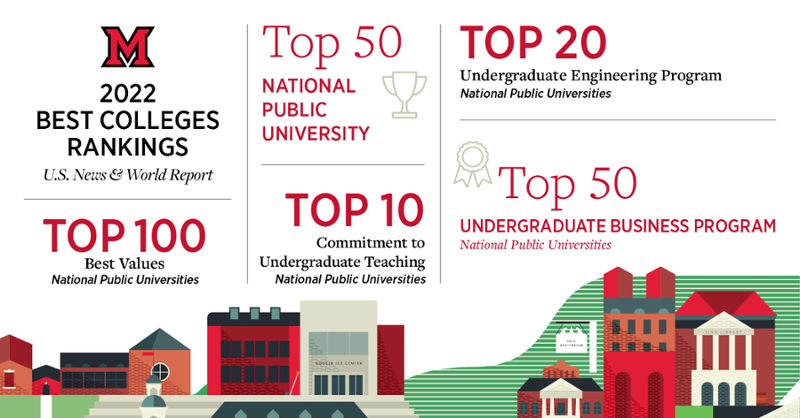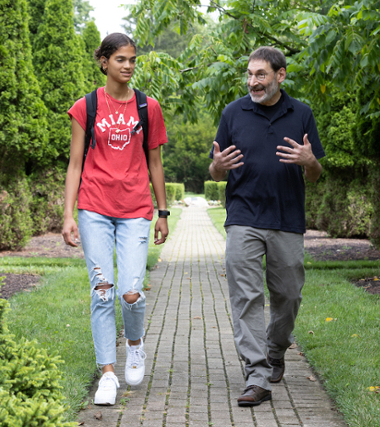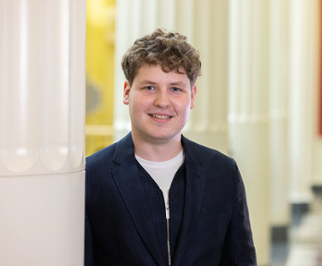

Miami’s top 50 national ranking stands firm in 2022 U.S. News and World Report Best Colleges rankings
Teaching and innovation recognized
By Carole Johnson, university news and communications
At No. 46 among national public universities, Miami University is in the top 50 of U.S. News & World Report’s just-released 2022 rankings.
In a special list, Miami is in the top tier of national institutions recognized for “unusually strong commitment to undergraduate teaching.” This is the 12th year that Miami has been recognized for its faculty commitment to teaching.
Miami is No. 6 among public universities on the list for strong commitment to undergraduate teaching, and the university moved up to No. 22 including private schools. Miami is listed among outstanding public universities who rank in the top five for this special list, including Georgia State University, the University of Maryland-Baltimore County, the College of William & Mary, Arizona State University, and the University of Michigan.
“We are honored to be recognized in these newest rankings,” Miami University President Gregory Crawford said. “This achievement reflects Miami University’s commitment to educational excellence and student success and further affirms the value of our degree programs and the dedication and excellence of our faculty.”
Faculty-student connections enhance teaching and learning

Junior Denali Selent walks with Jonathan Levy, associate professor of Geology. Selent is student representative, and Levy is co-chair, of Miami's Climate Action Task Force.
The faculty focus on teaching has long been recognized as a strength at Miami and is marked by numerous faculty-student connections, including:
- More than 2,800 Miami undergraduates conduct research with faculty annually.
- About 55% of Miami students study away (in the U.S.) or abroad, making Miami a national leader in providing such experiences. Many of these opportunities are led by Miami faculty.
- Faculty and staff advising support the 50% of students who carry a double major or minor.
- Miami faculty provide professional development support for students through the Center for Career Exploration and Success.
Jonathan Levy, associate professor of Geology, said Miami provides opportunities for students to learn, create new knowledge, and make the world better.
“Our job is simple, to improve society. That’s all. No pressure,” said Levy, who also is the director of Miami’s Institute for the Environment and Sustainability.
“As a faculty member and hopefully a mentor, I provide opportunities for students to exchange ideas, challenge assumptions, and become better global citizens. These are values that all Miami faculty take very seriously, and it all starts with personal interactions.”
Junior Denali Selent is a member of Miami’s Climate Action Task Force, where her passion for sustainability deepened. She is an Engineering major and Environmental Science co-major.
“My professors work hard to make sure that I am not only grasping the academic material but also that I am developing skills, like the ability to think critically, communicate and work on a team, and systematically break down problems,” she said, adding that Miami gave her that confidence boost she needed.
Emil Barr also knows that there is something special at Miami — an entrepreneurial mindset that permeates from professor to student. During his first year at Miami, Barr founded and launched Step Up Social. The company manages social media accounts for clients.

Emil Barr, second year Business Economics and International Studies double major.
“Miami and the Farmer School of Business supported us every step of the way,” said Barr, who is a second-year Business Economics and International Studies double major.
That commitment to teaching defined by U.S. News & World Report in its rankings is illustrated by the advisory board Barr was able to form for his company. Miami professors with expertise in management, marketing, entrepreneurship, and digital content spent countless hours with Barr’s student-run, start-up team.
“We created something truly special here at Miami — a business that combines the experience of leading professors with young people’s understanding and love for social media.” Barr uses the word ‘amazing’ many times to describe his experiences, including the connections he has made. “The entrepreneurship program here at Miami put us in touch with CEOs of many different venture capital firms and accelerators, giving us the network we needed to break into the start-up world,” he said.
Innovation recognized
Miami is ranked 30th among national public universities in the Most Innovative Schools list.
Among all national universities, Miami is ranked at No. 57. The category recognizes schools making the most innovative improvements toward curriculum, faculty, students, campus life, technology, and facilities. Among public and private universities and colleges combined, Miami is listed as No. 103 out of 391 universities on the National Universities list. Among public universities, Miami is No. 86 for Best Value Schools. It also is in the top 50 national public universities in the category of Best College for Veterans, ranking No. 45.
Other U.S. News accolades include:
- Best Undergraduate Business Programs: No. 50 among national public universities.
- Best Undergraduate Computer Science Programs: No. 117 among national public universities.
- Best Undergraduate Engineering Programs (not doctorate-granting): No. 14 among national public universities, excluding U.S. service academies.
- Academic Programs to Look For: Miami’s Learning Communities rank No. 8 among national public universities.
Some U.S. News rankings are based on data, others on reputation. The list of universities with an “unusually strong commitment to undergraduate teaching” and the list of innovative schools come from a survey of college presidents, provosts, and admissions deans.
